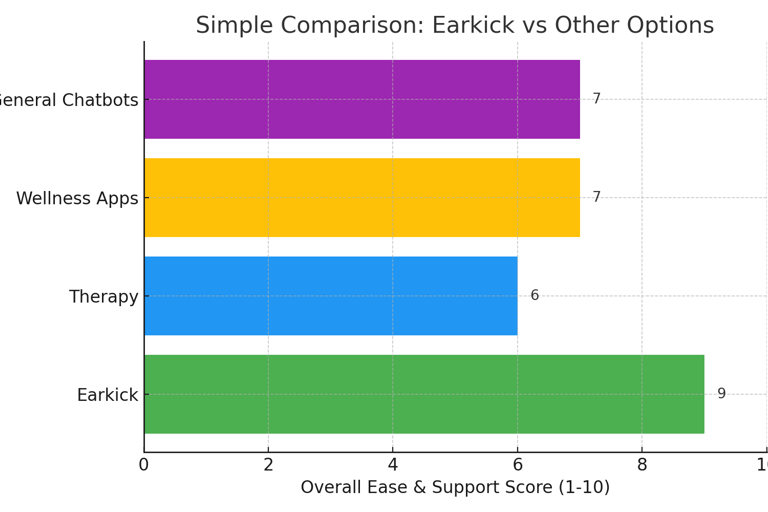Earkick: Your AI Powered Self-Care Companion
In today’s fast-paced world, it can feel like stress and anxiety are always lurking in the background. Whether it’s work deadlines, school pressures, or simply the daily grind, many of us struggle to find a healthy outlet to talk about our feelings. Traditional therapy is wonderful but not always accessible—whether because of cost, availability, or timing. That’s where tools like Earkick come in.
Earkick is an AI-powered platform designed to support mental health and wellbeing. Unlike general-purpose chatbots that answer questions about anything, Earkick focuses on helping people manage stress, track their emotions, and find healthier ways to cope with daily challenges. It’s not meant to replace therapy but to serve as a companion for mental wellness, offering guidance, reflection, and encouragement right when you need it.
In this article, we’ll take a closer look at what Earkick is, how it works, the benefits it offers, some real-life user scenarios, and how it compares to other tools in the mental health space.
What is Earkick?
At its core, Earkick is an AI mental health assistant. It’s available as a mobile app and acts like a digital companion you can check in with throughout your day. Instead of keeping your emotions bottled up, you can express how you’re feeling to the chatbot, which then helps you reflect on your mood, identify patterns, and even suggest small steps to feel better.
The creators of Earkick built it around one simple idea: mental health support should be free, private, and available anytime. Unlike traditional therapy sessions that happen once a week, Earkick is in your pocket 24/7. That means if you’re lying awake at night with racing thoughts or struggling before an exam, you don’t have to wait to talk it out—you can pull out your phone and “check in” with the app instantly.
Key Features of Earkick
Earkick isn’t just a chatbot you chat with—it’s a more holistic system built to encourage ongoing mental wellness. Here are its main features explained in simple terms:
Mood Tracking
Every time you talk to Earkick, you can log your mood. Over time, the app builds a picture of your emotional ups and downs, helping you notice patterns you might not have realized.AI Conversations
The chatbot engages in supportive dialogue. If you’re feeling anxious, you can type or speak your thoughts, and the bot will respond in a calming, non-judgmental way.Progress Charts
Earkick turns your daily check-ins into easy-to-read charts, showing you trends in your mood and stress levels. This can help you see whether certain habits or routines are improving your mental health.Self-Help Tools
Beyond chatting, Earkick provides exercises and strategies—like breathing techniques, grounding activities, or journaling prompts—that you can use to manage tough moments.Privacy by Design
One of Earkick’s biggest selling points is that it does not store sensitive data in a way that can be traced back to you. The focus is on privacy and safety, so users can feel comfortable being open and honest.
Why People Use Earkick
Everyone’s reasons for using a mental health chatbot are different, but Earkick appeals to people who want accessible and stigma-free support. For some, it’s a safe space to unload stress without worrying about judgment. For others, it’s a tool for building healthier habits, like journaling daily or pausing for mindfulness.
Because it’s free and doesn’t require an appointment, Earkick also makes mental health support far more inclusive. People who can’t afford therapy sessions or who live in areas with limited mental health resources can still have a supportive digital companion.


User Stories: How Earkick Fits Into Daily Life
To make this more real, let’s imagine some everyday scenarios where people might use Earkick:
The Student
Sarah, a college student, feels overwhelmed during exam week. She doesn’t want to burden her friends, and the counseling center is fully booked. Instead, she checks in with Earkick each night. By tracking her anxiety levels, she notices they spike right after pulling all-nighters. The app suggests healthier study breaks and relaxation exercises, which help her balance stress.The Professional
David, a young professional, struggles with workplace stress. Instead of carrying that tension home, he spends five minutes on Earkick during his commute. Talking it out with the bot helps him transition from “work mode” to “home mode,” improving his evenings with family.The Parent
Maria, a busy mother of two, often feels exhausted but doesn’t want to admit she’s struggling. She uses Earkick as a private outlet, logging moments of stress. Over time, the charts reveal that her stress peaks right before bedtime routines with her kids. Seeing this pattern helps her make small changes—like planning a calmer wind-down activity.The Night Owl
Alex often lies awake at night with racing thoughts. Since friends and family are asleep, he opens Earkick to offload his worries. The chatbot helps him practice grounding exercises, which gradually improve his sleep quality.
These stories show how Earkick can fit into very different lifestyles, providing tailored support whenever it’s needed.
Final Thoughts
Earkick represents an exciting development in the growing field of AI companions for wellbeing. It bridges the gap between doing nothing and seeking full professional therapy by offering a supportive, judgment-free space to track moods and practice self-care.
For people who want to better understand their mental health, spot patterns in their emotions, or simply have a safe outlet to talk about stress, Earkick is a powerful free tool. While it’s not a replacement for professional counseling, it can be a daily ally in building healthier habits and reducing the weight of everyday stress.
In a world where many people feel unheard or overwhelmed, Earkick provides a simple but important gift: a digital ear that always listens.
For current pricing, please refer to the link at the top of the page, as prices do fluctuate.
© 2025. All rights reserved.

